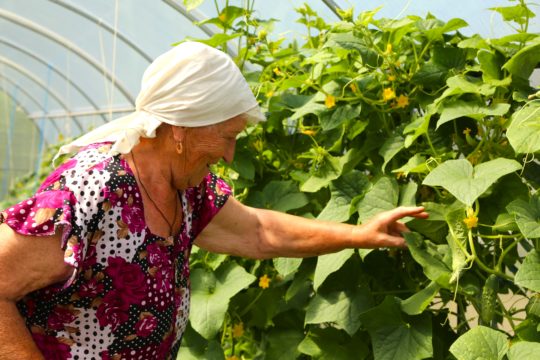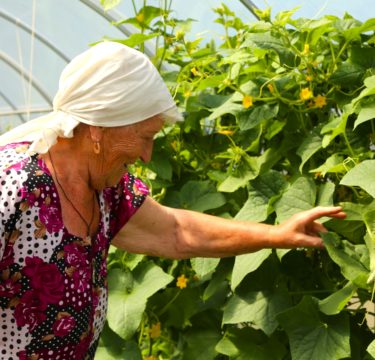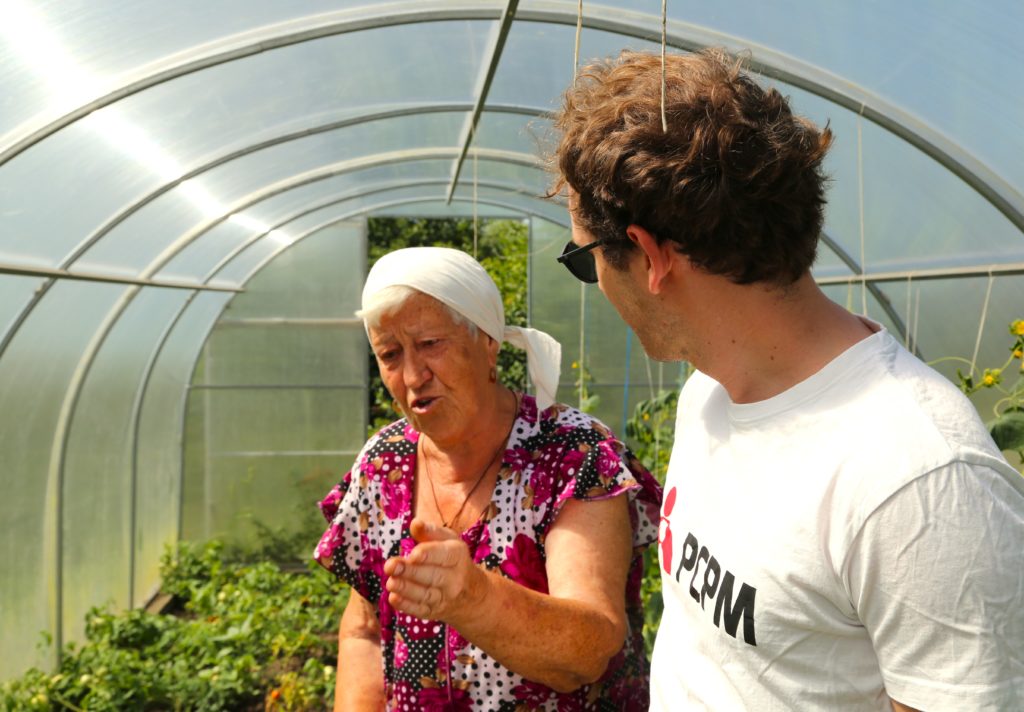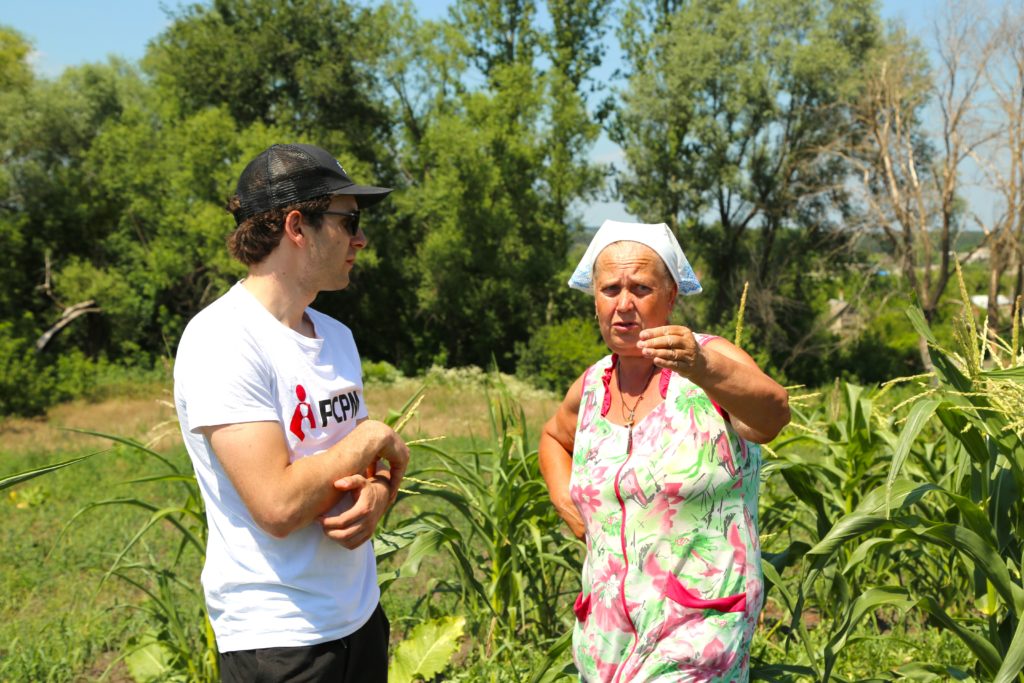Seeds of hope


– Try some cucumbers, you can’t buy such good ones in a shop in Kharkiv,’ encourages Nina, owner of a small farm in Derhachi, a town close to the Kharkiv metropolis. The 75-year-old smiles at the compliments and invites you to taste the tomatoes. Just as delicious, I announce, accompanied by artillery fire. – They are beating harder today… – the old lady admits and then returns to the fruit and vegetables. – ‘I’ve had a beautiful harvest this year,’ she says, smiling broadly again.
In the background, the alarm siren again begins to howl – in tones that suggest the wear and tear on the public address apparatus – but no one pays any more attention to it. In Derhachi they are used to the threat of war. The Russians occupied the village in the first hours of the invasion and were driven from it in the spring of 2022. Nevertheless, shells and bombs still dropped on the town – of the latter, including one-and-a-half tonne bombs. A bit ‘as a punishment’, because the locals did not want ‘Russian peace’, but mainly to make the inhabitants realize that ‘in Ukraine’ they will not find peace.
Today, this calm is even harder to come by, because in mid-May the Russians re-entered northern Kharkiv. They did not reach Derhachi; they were stopped a few kilometers outside the city, in the village of Liptsi. The offensive lost momentum, and the whole offensive turned out to be a nightmarish expensive undertaking for the occupiers. Nevertheless, they have bitten into the ground and are not far away, reminding the inhabitants of Derhachi of their existence from time to time.
– They will not drive us out of here with bombs,’ assures Nina. – Anyway, where am I going with this? – the woman takes her walking stick off the ground for a moment. – I’m too old and disabled to run anywhere – her words sound surreal in the cozy greenhouse.
But you can still hear the gunshots, the explosions, the wretched siren…
A precious piece of land
– And this is Natasha – Nina introduces her neighbor. – It is mainly thanks to her that this garden looks the way it does – the older woman sends the much younger one a grateful look. And then they both lead me deep into their vegetable and fruit kingdom. There is dill, carrots, potatoes, courgettes, cucumbers and tomatoes, raspberries, watermelons, and strawberries. And a lot of other crops, which form the basis of the daily diet.

– I have a three thousand UAH pension,’ admits Nina. For some time now, the currency conversion rate has been very simple – it is ten to one, which means that a woman, after more than 30 years of work, receives a benefit of… 300 PLN. Taking purchasing power into account, that’s the equivalent of roughly six hundred PLN. – If it wasn’t for this piece of land, I wouldn’t be eating much and not much at all,’ she grimaces for a moment, but soon regains her good humor. – There are so many crops that some of them can be sold at the Kharkiv market.
– Do you go there alone? – I ask.
– No, no, Natasha takes care of it – I hear. – The townspeople are greedy about our produce, although Kharkiv has been deserted recently and fewer people are willing to buy.
Wartime pragmatics
Has Kharkiv become deserted? Judging by the traffic, the population has declined compared to early autumn last year when I was last here. But the difference is by no means necessarily due to the fighting north of the city – Kharkiv residents are also accustomed to the threat. Partial absence could just as well be the result of summer and holidays. An exceptionally hot summer, which occurred in the reality of energy shortages – is worth pointing out. The power stations destroyed by the Russians are not working, Ukraine is rationing electricity, and the over 40-degree heat in flats deprived of energy – and therefore air conditioning and often water – prompts people to flee closer to forests and water bodies. Ot, war pragmatics.
Many organizations and diplomatic missions left Kharkiv because of the Russian offensive. The situation was considered potentially escalating and threatening to the health and lives of personnel. All too hastily, the Ukrainians not only managed to stop the attackers but also destroyed the rocket launchers deployed around the Russian city of Belgorod that were threatening the health and lives of personnel.
Anyway, representatives of the Polish Centre for International Aid were, and still are, working on the spot all the time. The Foundation is implementing several projects in the Kharkiv region, and Nina received support under one of them.
– In the spring, in cooperation with a local partner, we distributed more than two thousand packets of seeds, explains Michal Kulpinski of the PCPM. They went to the inhabitants of Derhachi, Tsyrkuny, and Rohania – my interlocutor listed the names of the villages and then pointed out an important aspect of such assistance.
– The project does not require a great deal of money but generates great added value. We are leaving the proactivity in the hands of the supported people, because they are the ones working on the crop, and they are the ones who ultimately decide what to do with the crop. Just does it make sense to tie people to the land in vulnerable areas?- I ask.
– We are diversifying our activities,’ assures Kulpinski. – Some of our projects in Ukraine are carried out far from the front line, some even just across the Polish border. And as for making sense, let me quote a local government official from near Kharkiv. ‘But we live here, we are not going anywhere. These are our homes, gardens, fields…’.
Strong and beautiful flowers
– And this was my house – 62-year-old Tetiana from Tsyrkuny points to the rocket-ruined building with her hand. – It was built by my parents as long as they were alive, cared for, and repaired. I thought I would die in it, too, but fate wanted otherwise,’ she smiles sadly.
Today, she lives with neighbors but spends most of her days on the family property – especially at the back. When she gets tired of working in the garden, she rests on the bed she has put up in the tool shed.- Somehow I just can’t come here,’ she admits. Looking after the crops calms her down, and gives her a sense of purpose. – As long as the soil is producing, there is hope,’ she says.

I am moved by her singular determination. Crops like crops – and these also come from ‘PCPM seeds’ – are concrete, they can be eaten, given to neighbors, or donated to soldiers on the block posts.
– The boys are thirsty for fresh vegetables – Tetiana, like many Ukrainians, especially in her old age, speaks of the military with parental tenderness. And she talks almost as much about the flowers she cherishes, growing where they have always grown – once in front of the house, now in front of what is left of it. – There was a rocket funnel here, and now roses are growing out of it. Strong and beautiful flowers…
—–
The seed distribution program is in partnership with local organizations Rescue Now UA and I Am Saved. Funding for this (and other activities in Ukraine, totaling $4 million) was raised by PCPM from the Taiwanese government.
Author Marcin Ogdowski